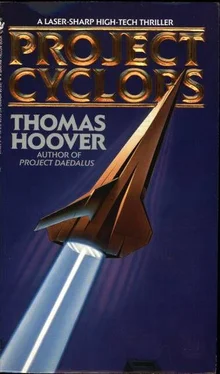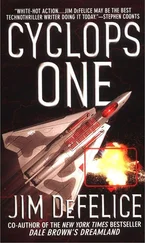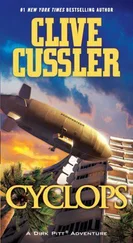Thomas Hoover - Project Cyclops
Здесь есть возможность читать онлайн «Thomas Hoover - Project Cyclops» весь текст электронной книги совершенно бесплатно (целиком полную версию без сокращений). В некоторых случаях можно слушать аудио, скачать через торрент в формате fb2 и присутствует краткое содержание. Жанр: Триллер, на английском языке. Описание произведения, (предисловие) а так же отзывы посетителей доступны на портале библиотеки ЛибКат.
- Название:Project Cyclops
- Автор:
- Жанр:
- Год:неизвестен
- ISBN:нет данных
- Рейтинг книги:4 / 5. Голосов: 1
-
Избранное:Добавить в избранное
- Отзывы:
-
Ваша оценка:
- 80
- 1
- 2
- 3
- 4
- 5
Project Cyclops: краткое содержание, описание и аннотация
Предлагаем к чтению аннотацию, описание, краткое содержание или предисловие (зависит от того, что написал сам автор книги «Project Cyclops»). Если вы не нашли необходимую информацию о книге — напишите в комментариях, мы постараемся отыскать её.
Project Cyclops — читать онлайн бесплатно полную книгу (весь текст) целиком
Ниже представлен текст книги, разбитый по страницам. Система сохранения места последней прочитанной страницы, позволяет с удобством читать онлайн бесплатно книгу «Project Cyclops», без необходимости каждый раз заново искать на чём Вы остановились. Поставьте закладку, и сможете в любой момент перейти на страницу, на которой закончили чтение.
Интервал:
Закладка:
After reading every NASA report that NTIS had released on microfiche, she knew no one there had created anything like it. She also figured out that NASA was a hotbed of careerists, all protecting their own turf. The only obstacle to their accepting her new computer program would be the NIH syndrome-Not Invented Here. It turned out she was right, and wrong.
By happy chance, her dissertation came to the attention of Dr. Edward Olberg, a deputy director of trajectory control at the Kennedy Space Center, who hired her a week later, with a GS rating a full two grades higher than customary. He knew a good thing when he saw it. And now Dr. Cally Andros' computer work was the creation of a NASA employee. End of problem. She still wanted to be in the astronaut program, but she figured she had made a good start.
She was wrong. It turned out that she was far too valuable in the guidance section to let go. She published a lot of papers, grew very disillusioned, and was on the verge of telling them to stuff it, when…
An executive unknown to her, named William Bates, called one May morning three years ago, said he had read all her papers, and then offered her a job that caused her to postpone her dreams of space flight. He wanted her to head up a private space program. She was, he told her, too good to work for the government. She should be out in the real world, where things happened.
When she recovered from the shock, she felt an emotion she had not known since her first day at Bronx Science-she was scared. In the business world, the responsibilities were clear-cut and fatal. You were not blowing some anonymous taxpayer's money: it was real cash. Furthermore, your responsibilities doubled. Not only did you have to make it work, you had to make a profit. She loved the challenge, but she quaked at the enormous risk.
Finally she made a deal. Yes, she would give up a sure career for a risky long shot, but on two conditions. First, she got to pick her staff, and second, someday she would get to go into space herself.
Although he clearly thought the second demand rather farfetched for SatCom, he assented to both…
"How's it looking, Cally?" Bates was striding into Command, having just emerged from his office at the far end of the cavernous room. Fifties, gray-templed but trim, he wore a trademark open-necked white shirt and blue trousers-a touch of the yachtsman, even ashore. A former Vietnam fighter pilot, he had flown over from the company's head office in Arlington, Virginia two days ago-setting down the company's Gulfstream IV at Athens-to be on hand when the first vehicle, VX-1, went up. As he stalked up, he was his usual crabby self, seemingly never satisfied with anything that was going on.
She looked him over and stifled the horrible impulse she had sometimes to call him Alan. He was short-tempered, the way Alan Harris was, and he had the same curt voice. Otherwise, though, they were nothing alike. The mind works in strange ways.
"Cyclops countdown is right on the money, Bill. to the second. Big Benny is humming, and coil temps are nominal. Georges says it's a go for sure this time. We're going to achieve the power levels needed to lase." (They had tried two preliminary power-ups previously, but the supercomputer had shut them down in the last hour of the countdown both times.) "Looks like tonight is the night we get lucky."
Georges LeFarge had served as her personal assistant throughout the project, even though he formally headed up the computer section. These days he was still slim, almost emaciated, with a scraggly beard he seemed to leave deliberately unkempt, just as he had at Cal Tech. Bates had bestowed on him the title of Director of Computer Systems, which did not sit well with his leftist politics. His conscience wanted him to be a slave to the exploiting capitalists, not one of them. However, he always managed to cash his bonus checks. He had carried on a flirtation with Cally, sending messages back and forth on the Fujitsu's workstations, for the last two years. She had finally taken him up on it; and it was a bust all around. C'est la vie.
At this moment he was blended into a sea of shirt-sleeved technicians glued to the computer screens in Command Central, the nerve center of the entire operation. The young Americans all worked in a room slightly smaller than three tennis courts, with rows of light-beige workstations for the staff and three giant master screens that faced out from the far wall. The soft fluorescents, cheerful pale-blue walls spotted with posters and the large SatCom laser-eye logo, muted strains of Pink Floyd emanating from speakers somewhere in the corner, and circulated air carrying a hint of the sea-all made the perfect environment for the nineteen young workers spaced comfortably apart at the lines of desks this evening shift.
As they watched, the superconducting coil ratcheted increasingly larger bursts of energy into the accelerator, pumping it up. At twelve gigawatts the Cyclops should-if all went well-begin to lase.
The coil, a revolutionary new concept for storing electrical energy, was situated deep in the island's core. It was a near-perfect storage system, permitting a huge current of electricity to circulate indefinitely without resistance, ready to produce the massive, microsecond pulses of power. The heart of the system was an electromagnetic induction coil 350 feet in diameter and 50 feet high embedded in a natural cave in the island's bedrock. The coil itself was a new niobium-titanium alloy that became superconducting, storing electricity without resistance losses, at the temperature of liquid nitrogen. A vacuum vessel almost like a giant Thermos bottle surrounded the coil and its cryogenic bath.
The coil fed power into a particle accelerator that drove the complex's centerpiece, the Cyclops-a free-electron laser designed to convert the energy stored in the coil into powerful pulses of coherent microwaves. The supercomputer would then focus these with the phased-array antennas into the propulsion unit of the space vehicle. That unit contained simple dry ice-the only thing simple about the entire system-which would be converted to plasma by the energy and expand, providing thrust for the vehicle.
"Cally, we have ten point three gigs," LeFarge announced confidently. He was absently stroking his wisp of beard. "Power is still stable."
"Good." She watched the readout on the computer screen in front of her as the numbers continued to scroll. If the Cyclops performed the way the engineers were all predicting, the world's most powerful laser was about to go critical. A thrill coursed through her.
The idea was brilliant. By directing the energy to a space vehicle, you kept the power plant for its rockets on the ground. Unlike conventional rockets, the vehicle's weight would be virtually all payload, instead of almost all fuel. It would cut the cost of launching anything by a factor of at least a hundred…
Now a green oscilloscope next to the computer screens was reading out the buildup, a sine curve slowly increasing in frequency.
"Eleven point one," Georges announced, barely containing a boyish grin. "We're still nominal."
Cally glanced at the screen. "Let's keep our fingers crossed. Almost there."
"By the way," Bates interjected, "assuming everything goes well here tonight and the storm lets up, I've scheduled myself on the Agusta over to Kythera in the morning. A friend of mine was sailing near there, and I'm a little worried. I just tried to reach him on the radio and got no answer. Maybe his radio got swamped, but I want to find out." He was turning to head back to his office. "Now, though, I've got some calls in to Tokyo. So keep me informed on the countdown, and your feelings on the weather."
More investors, she caught herself thinking. Begging. Which must mean the money's getting tight again. But hang in there just a couple more days, Bill, and we're gonna show the world a thing or two. They'll be begging you to let them invest.
Читать дальшеИнтервал:
Закладка:
Похожие книги на «Project Cyclops»
Представляем Вашему вниманию похожие книги на «Project Cyclops» списком для выбора. Мы отобрали схожую по названию и смыслу литературу в надежде предоставить читателям больше вариантов отыскать новые, интересные, ещё непрочитанные произведения.
Обсуждение, отзывы о книге «Project Cyclops» и просто собственные мнения читателей. Оставьте ваши комментарии, напишите, что Вы думаете о произведении, его смысле или главных героях. Укажите что конкретно понравилось, а что нет, и почему Вы так считаете.












